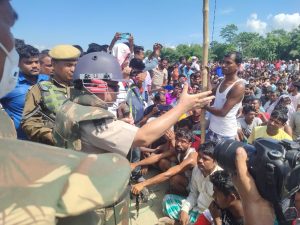An eviction drive launched by the Assam government against Bengali-speaking Muslim encroachers on government land has snowballed into a huge controversy after two people were killed and 11 others, including nine policemen, injured during the operation.
The incident has triggered outrage across India and abroad after a video of police brutality emerged. The video shows policemen thrashing a man and shooting him in the chest, while a government-appointed photographer can be seen kicking and stomping on the body of the victim. The video has gone viral on social media and was subsequently aired by TV news channels.
The incident happened on September 23 at Dholpur-3, where government officials had planned to evict families of Bengal origin Muslims who were inhabiting an area of around 600 hectares of government land. The eviction is meant to free land for the Gorukhuti multipurpose agriculture project.
A similar operation was executed without any trouble on September 20 at another location in the same region when the evicted families were relocated elsewhere. An estimated 7,000 people have been rendered homeless as a result of these eviction drives. The government has assured evicted families of compensation with land provided elsewhere.
The controversy notwithstanding, the Assam government has said that it will continue with eviction operations against those encroaching on free government land. Plans have been firmed for another drive at a forest in Lumding.
Large tracts of government land, forests and riverine islands in Assam were encroached upon by settlers over the past several decades. In 2018, the government disclosed that close to 400,000 hectares of forest land were under illegal occupation in the state. According to another government appointed panel, almost 900,000 hectares of government land, including forests, had been encroached upon across the state.
Eviction drives in Assam have been carried out intermittently over the past several years but fast-tracked after the new government led by the Bharatiya Janata Party (BJP) was sworn-in in May. The BJP and its ally, the Asom Gana Parishad, pledged ahead of the recent elections that encroachers would be evicted and illegal immigrants identified and deported from the state.
Given its anti-Muslim outlook, the BJP’s evictions are being interpreted as distinctly biased against Muslims. The party’s allegation that most of the encroachers at Dholpur are illegal Bangladeshi immigrants who had settled here from other districts in the state has been opposed by other organizations and political parties.
In 2019, the BJP enacted the controversial Citizenship (Amendment) Act in Parliament enabling a section of non-Muslims from the neighboring countries of Bangladesh, Pakistan, and Afghanistan to acquire Indian citizenship. Two months ago, the Assam government issued an additional order exempting Gorkhas (a community from Nepal) from being tagged and prosecuted as foreign nationals.
The update of the National Register of Citizens, an exercise to compile a list of citizens in Assam and mandated by the Supreme Court, has also been interpreted as a BJP project to disenfranchise Muslims in the state. The government has not yet issued a notification accepting the register but has hinted that it would approach the apex court with a plea for reverification of the list in the border districts of the state.
The roots of migration in Assam can be traced to the 19th century when the country was under colonial rule. Different communities from different regions settled in the border state for jobs, cultivation, and business. Among them were a large number of Bengali-speaking Hindus and Muslims from East Bengal (later East Pakistan and subsequently Bangladesh).
The migration of Bengali-speaking communities continued after the country’s independence and comprised both refugees and migrants in search of livelihoods. Their swelling numbers, which were reflected in the decadal census reports, enhanced the fear among the local Assamese that they would soon be outnumbered by the Bengali-speaking communities.
In 2005, the Supreme Court said that Assam was facing “external aggression” due to the illegal immigration while repealing a controversial law called Illegal Migrants (Determination by Tribunals) Act.
Numerous laws have been enacted and two agreements were also inked between the government and the All Assam Students Union (AASU) to identify foreign nationals in Assam.
India has also undertaken fencing of the Bangladesh-India border to prevent infiltration into the country. This is yet to be completed.
Not only has the task of identifying foreign nationals been controversial and inefficient but also, almost all the major political parties have taken advantage of the immigration issue to win elections in the state.
At Dholpur, where the recent eviction of encroachers took place, previous governments in Assam had established health facilities and schools with the objective of converting these settlements into vote banks. The same story is unfolding at several other areas in the state where government land has been encroached.

































